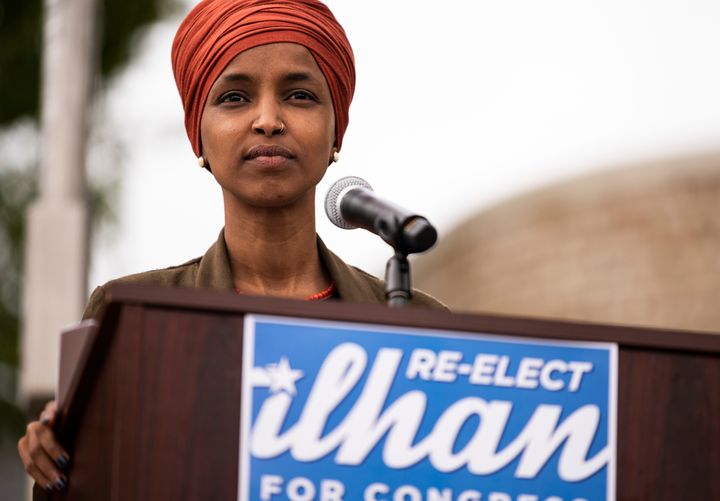[ad_1]
Antone Melton-Meaux, the attorney challenging Rep. Ilhan Omar in Minnesota’s Democratic primary election Tuesday, stands accused of violating campaign finance law by failing to adequately disclose how he is spending his campaign funds.
Melton-Meaux, his campaign and three companies that he paid for services violated the Federal Election Campaign Act by “conspiring to intentionally obscure the individuals providing services” to his campaign in clear contravention of the law’s disclosure requirements, the Minnesota Democratic-Farmer-Labor Party alleged in a complaint filed with the Federal Election Commission on Tuesday.
The DFL, as Minnesota’s Democratic Party is known, endorsed Omar.
The Campaign Legal Center, a nonprofit campaign and elections watchdog, filed its own complaint with the FEC Friday against Melton-Meaux’s campaign, officially called Antone for Congress, on similar grounds.
In a statement, Melton-Meaux called the DFL’s complaint “frivolous and baseless.”
“This is a continuation of more divisiveness and distraction from my opponent, Rep. Ilhan Omar, who is clearly desperate to revive a failing campaign,” he said.

Melton-Meaux’s bind shines a light on the pitfalls of a Democratic Congressional Campaign Committee policy barring party-approved vendors from working with candidates challenging House incumbents in primaries. Melton-Meaux’s vendors are hiding their identities using shell companies so they can circumvent a party blacklist.
“Organizations and consulting firms are trying to preserve their professional careers and their livelihoods in spite of the onerous decision by the DCCC, and frankly, that is chilling and dangerous to the democratic process,” Melton-Meaux said. (He gave The Washington Post a virtually identical quote.)
The Federal Election Campaign Act of 1971 requires candidates for federal office to disclose each of their itemized expenses over $200.
But more than three-quarters of the money that Antone for Congress spent went to three anonymous shell companies apparently created to conceal the identities of other companies. None of the shell companies was ever listed on FEC disclosures in the past, and none has a public-facing internet presence describing its business.
Two of the shell companies were incorporated in Delaware, where many companies incorporate because of the state’s lax regulation, according to a July MinnPost report. A third company’s origins are unknown, but it has a name similar to that of another Delaware shell company, according to a report by the investigative news site TMI.
At the time of the MinnPost report, Melton-Meaux’s campaign provided only the broadest possible information about the firms while revealing nothing about their ownership structures or histories with other candidates. The campaign described the two firms uncovered by MinnPost — Lake Point Consulting and North Superior Consulting — as “strategic communications firms that provide strategic counsel for the campaign.”
Melton-Meaux and his campaign subsequently admitted that they agreed to nondisclosure agreements with the vendors behind the shell companies specifically to help those companies evade the Democratic campaign committee’s blacklist.
The committee, which is House Democrats’ campaign arm, announced in March 2019 that it would not contract with ― or recommend to its candidates ― firms that work for candidates challenging sitting House Democrats.
Transparency is a cornerstone of democracy and in campaign finance law. Transparency provides voters with information they need to cast an informed vote.
Brendan Fischer, Campaign Legal Center
Those admissions are a critical part of the case against Melton-Meaux. The FEC has traditionally required a campaign to knowingly conceal the recipients of its funds in order to be considered in violation of the law. Campaign finance law is more accommodating to campaigns in cases where nondisclosure is incidental, as when a campaign does not disclose the identity of every subcontractor hired by a campaign vendor.
The Democratic-Farmer-Labor Party complaint cited a set of frequently asked questions that Antone for Congress included in an email to supporters in which the campaign explicitly stated that the nondisclosure agreements were meant to disguise companies that do business with the Democratic campaign committee.
“The Antone for Congress campaign committee works with several vendors and registered LLCs for a variety of services who had to protect themselves from the DCCC,” the campaign wrote in its FAQ. “These expenditures and their reporting are legal and compliant with FEC rules.”
The party complaint pointed to the language as evidence of “the Respondents’ specific intent to avoid reporting requirements of the vendors actually providing services to Antone for Congress to ‘protect’ the three vendors” from the Democratic campaign committee.
Jerry Goldfeder, a New York City-based election attorney, said that the complaints against Melton-Meaux have legal merit.
“Disclosure requires honesty,” he said. “The public has a right to know who contributes to campaigns and how campaign monies are expended.”
The Melton-Meaux campaign provided a statement from its election attorney, Scott Thomas, a former FEC commissioner. Thomas maintains that the commission views privacy and business considerations of the kind held by vendors protecting their relationship with the Democratic campaign committee as legitimate reasons for the establishment of a limited liability corporation that conceals details about their identities.
“The complaint by the DFL would be rejected by the FEC because it lacks merit,” Thomas said. “LLCs are recognized legal entities under the law that provide liability protections, protect separate personal assets of those who form them, and provide bank privacy and tax benefits as well.”
Regardless of how the FEC ultimately rules, there are many potential ways in which Melton-Meaux’s opaque campaign spending system could prevent the public from learning relevant information about his campaign.
For example, more detailed disclosures would reveal whether a super PAC supporting Melton-Meaux’s bid is using any of the same vendors as the campaign and thus whether the campaign might be illegally coordinating with that super PAC. (Super PACs are allowed to receive and spend unlimited sums from individuals or corporations so long as they do not coordinate directly with candidates.)

The public might also have an interest in knowing which other candidates and clients those vendors have worked for. In Melton-Meaux’s case, that’s particularly salient because Omar has made an issue of some of his donors’ contributing to the reelection of President Donald Trump.
“Transparency is a cornerstone of democracy and in campaign finance law. Transparency provides voters with information they need to cast an informed vote,” said Brendan Fischer, a campaign finance attorney for the Campaign Legal Center. “When candidates develop schemes to deprive voters of that information, they’re undermining the ability of voters to cast an informed ballot.”
Fischer likened Melton-Meaux’s conduct to similar alleged practices by Trump. The Campaign Legal Center filed a complaint against Trump in July accusing his reelection campaign of routing campaign spending through a handful of firms run by Trump cronies rather than listing the itemized expenditures to the firms with which the larger firms contracted.
But the complaint against Trump only accused the president of using the favored firms as pass-through entities for about 60% of his spending ― a lower proportion than that used by Melton-Meaux’s campaign, Fischer said.
“The Trump campaign … set an awfully low bar, but Antone for Congress seems to have crossed it,” Fischer said. “In many ways, Antone for Congress is taking the Trump campaign’s secrecy scheme even further.”
Cole Leiter, a spokesman for the Democratic Congressional Campaign Committee, deferred to election attorneys about how to handle the controversy over Melton-Meaux’s spending.
“If Mr. Melton-Meaux is, in fact, intentionally using a shell company to hide his vendors as this complaint alleges he has done, this is a legal question first, not a political one,” Leiter said.
The attention that Melton-Meaux’s arrangement has drawn nonetheless increases scrutiny on the campaign committee’s policy of blacklisting vendors who work with primary challengers.
Progressives decried the blacklist from the moment it was announced, arguing that it constrained the rights of candidates from varied backgrounds to contest elections.
In response to that criticism, one of the committee’s justifications for the rule was that it would apply equally to more moderate Democrats challenging progressive incumbents.
But the ease with which Melton-Meaux skirted the rule is evidence of the policy’s failure, according to Karthik Ganapathy, a progressive campaign operative-turned-consultant who works with left-leaning primary challengers.
“The DCCC blacklist was an ill-considered idea from the very beginning,” he said. “Not only is it ham-fisted and undemocratic, it’s also clearly a problem to enforce in and of itself.”
Calling all HuffPost superfans!
Sign up for membership to become a founding member and help shape HuffPost’s next chapter
[ad_2]
Source link

